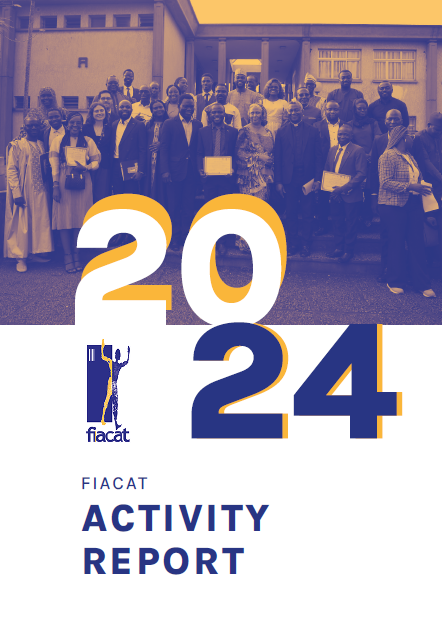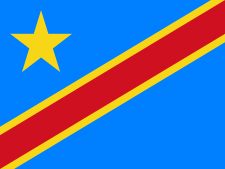France's foreign policy in Africa: human rights and democracy absent
28 February 2023. As part of diplomatic visits to the African continent, French President Emmanuel Macron will visit the Democratic Republic of Congo (DRC) on 5 March 2023, after visiting Gabon, Angola and Congo-Brazzaville. 31 civil society organisations, including FIACAT and ACAT DRC, are encouraging France to place the defence of human rights and respect for democracy at the heart of its foreign policy.
French President Emmanuel Macron's visit to the DRC, the largest French-speaking country in the world, is taking place in a particularly difficult context for the Congolese people. When violence has been going on for more than thirty years, can we still talk about a crisis? At the end of 2021, the rebel group Mouvement du 23 Mars (M23) reappeared in the east of the country, where many other armed groups are operating, creating new episodes of violence and localised conflicts. Civilians, especially women, are, as always, the first victims.
The humanitarian situation is critical, and the rise of hate speech is adding fuel to an already burning inferno that could ignite other countries in the region. The elections scheduled for December 2023 are a crucial step in the consolidation of the country's democratic life, but represent a challenge both from the point of view of their logistical organisation and in view of the political and security situation in which they take place.
In 2017, when he had just been elected for the first time, the French President declared before African students in Ouagadougou that he intended to "stand by those who work daily to make democracy and the rule of law irreversible". Almost six years later, it is more than ever time for these declarations to be implemented. President Macron's visit to the Great Lakes is an opportunity to make French diplomacy in favour of human rights more than just wishful thinking, but a reality.
The DRC has an active and dynamic civil society, which ensures the proper functioning of democratic life in the country. Activists, human rights defenders and journalists are committed to working alongside the Congolese population, often at the risk of their lives. This first visit of President Macron to the DRC must be as inclusive as possible, especially in the current context of tension. In this respect, it is essential that Congolese civil society be heard. We strongly encourage the President to include, in his programme, consultations with its representatives at a time when the Congolese population is wondering about the ambivalence of the French position.
The recent announcements by France and the European Union (EU) on Rwanda's position in the regional context, with on the one hand the condemnation of Rwanda's support for the M23 rebels in the DRC, and on the other hand the granting of 20 million euros in aid to Rwandan forces for their intervention in northern Mozambique - where serious allegations have been made about the preservation of the economic interests of the French company Total Energies - have raised legitimate questions.
The human rights risks and impacts of such projects have already been analysed and denounced by civil society, as well as by the European Parliament, in the context of Total Energies' exploitation of Lake Albert oil between the DRC and Uganda. In this respect, it is essential that France adopts a firm position that calls for respect for human rights, responsible investment and economic relations that respect international standards and the environment in the DRC, and more generally in Africa. France must take advantage of its visit to the DRC and Africa to inquire about the effective implementation of the duty of care by companies operating and deploying their value chain in the DRC.
Since 20 February, the EU has adopted a new strategy on the Great Lakes which prioritises economic aspects as a global response to conflicts in the region to the detriment of policies based on respect for human rights and good governance. As President Macron's visit comes after Pope Francis' visit to Kinshasa in January 2023, where he strongly condemned the plundering of African countries and the DRC, it is essential that France supports initiatives to address the root causes of conflicts in the sub-region. Support for the fight against impunity for the most serious crimes and for ongoing transitional justice efforts, as well as support for the peace efforts and processes initiated, should be at the heart of France's visit to the DRC. If the rise of actors such as China or Russia on the African continent is today a reality that counteracts the place of the EU in the Great Lakes region, it is in democratic values and human rights that European and French cooperation finds its added value, and not in increased economic competition with actors such as China and Russia.
With regard to the electoral process in the DRC, it is important to remind the Congolese government of its own commitments in terms of inclusiveness, respect for civil and political rights, but also in terms of the participation and political representation of women in this process, under the 2015 law on parity. Supporting the effective implementation of these commitments means supporting the efforts of the Congolese authorities to restore the confidence of the Congolese population in its institutions, which is essential for the creation of an environment conducive to the holding of credible and peaceful elections. During this electoral period, it is also important to support the UN Joint Human Rights Office (UNJHRO) in its mandate of monitoring and reporting on the human rights situation in the DRC, as well as the mechanisms for the protection of human rights defenders.
The signatory organisations call on President Emmanuel Macron to place the defence of human rights and respect for democracy at the heart of his foreign policy :
Action des chrétiens pour l’abolition de la torture de République démocratique du Congo (ACAT RDC)
Actions Sans Frontières (AFRO)
Agir ensemble pour les droits humains
Association africaine des droits de l’Homme (ASADHO)
Célébrons le courage de la Femme
Centre de Recherche et d’information pour le développement (CRID)
Centre International pour la Promotion de Développement et des Droits de l’Homme (CEIPDHO)
Collectif Simama Congo (COSIC)
Commission Justice et Paix Belgique francophone
Congolese International Congres (CIC)
Emmaüs International
Ensemble contre la peine de mort (ECPM)
Fédération internationale des ACAT (FIACAT)
Fédération internationale pour les droits humains (FIDH)
Foundation for Human Rights Initiative (FHRI) (Uganda)
Groupe Lotus (RDC)
Justicia, asbl
Karibu Jeunesse Nouvelle (KJN)
Le Mouvement de la Paix
Ligue burundaise ITEKA
Ligue des Electeurs (RDC)
Misereor
Nouvelle Dynamique de la Société Civile en RDC (NDSCI)
Observatoire des Droits de l’Homme au Rwanda (ODHR)
Organisation mondiale contre la torture (OMCT)
Protection International
Réseau européen pour l’Afrique Centrale (EurAc)
SAPI International
SOS IJM
Tournons La Page (TLP)
Vision Social (VISO)
Ligue des droits de l’Homme (LDH)




